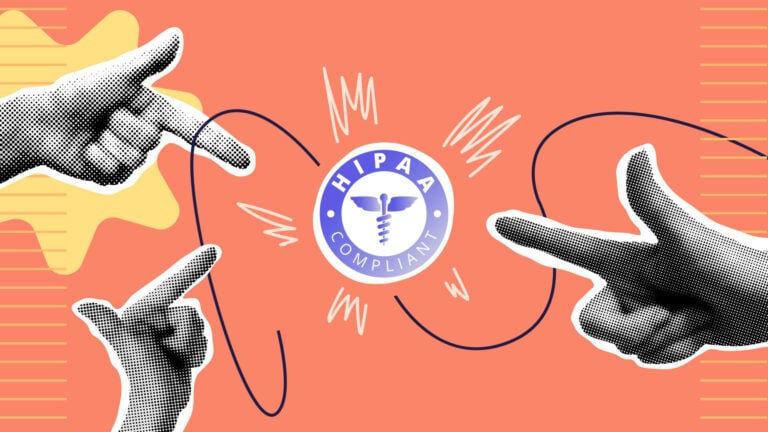Healthcare certifications can help your employees develop new skills and increase the potential of your existing workforce. We take a closer look at 12 healthcare certificates worth considering and offer tips on how to help employees get them.
Hiring new employees isn’t the only or even the best way to bring new skills to your healthcare business.
Instead, helping your current employees gain new expertise can open new opportunities for your company while also boosting your employee retention rate. Upskilling your current employees is also faster and cheaper than hiring new employees.
One of the best ways to upskill your healthcare employees is by helping them obtain new, relevant certifications. In this guide, we’ll explore 12 useful healthcare certificates and explain how you can help your employees pursue them.
Key Takeaways
- Healthcare certifications are standardized credentials that demonstrate an individual has learned a specific set of medical skills. Examples include Certified Medical Assistant (CMA) and Certified Nursing Assistant (CNA) certifications.
- Encouraging employees to pursue new certifications can increase their skillset and value to your company. Supporting education can also increase employee retention.
- You can support employees seeking certificates by paying for courses, building study time into employees’ schedules, and offering in-house training and tutoring.
What is a Healthcare Certification?
A healthcare certification is a professional credential that demonstrates knowledge of a specific medical skillset. It’s similar to a diploma, except that it’s usually earned by completing a short, highly focused program.
Healthcare certificates are issued by certifying agencies, often a professional medical or educational organization. Some common certifying bodies in the medical field include the National Healthcareer Association and the American Association of Medical Assistants.
To earn a given certification, individuals must go through the same training, pass the same set of exams, and fulfill the same set of requirements. This ensures everybody is taught the same skills and knowledge and that everybody is held to the same standards.
As an employer, that means you can trust that anybody holding a particular certification has met the same high standards as their peers.
Connecteam is now HIPAA-compliant. Once you sign into a BAA, you and your staff can discuss sensitive patient information and store patient documents directly in the app without worrying about data breaches or non-compliance.
Get started with Connecteam for free today!
Are Healthcare Certificates Worth It?
Helping your employees attain new certifications can be hugely beneficial, both for them and for your company.
First, employees who complete certificate programs acquire new skills, which they can use to improve your company’s operations, offer new services to customers, and more. An employee who gets certified in medical billing, for example, can use their new knowledge to improve billing processes. This reduces the time it takes to bill patients and ensures accurate and compliant billing.
Over time, employees who gain many skills through certifications can take on leadership roles within your business. This enables them to pass on what they’ve learned to other employees. They may also be able to make organizational changes within your company that improve productivity and patient outcomes.
In some cases, employees must have certain healthcare certificates in order to legally perform certain medical procedures. So, helping employees gain certifications can enable your business to offer new procedures or reduce waiting times for procedures you already offer.
Supporting your employees’ education can also improve morale and retention. Employees who are given the opportunity to grow professionally are more likely to feel fulfilled and to want to keep working for your company.
In the long run, retaining motivated employees who are excited to keep learning about the healthcare profession can have a powerful impact on your business.
12 Healthcare Certificates to Advance Your Career and Company
Let’s take a closer look at 12 of the most valuable healthcare certificate programs that can help your employees grow and add new value to your company.
Certified Clinical Medical Assistant (CCMA)
Certifying Organization: National Healthcareer Association
Average Program Length: 6-12 months
Program Cost: $2,000-$4,000
Prerequisites: High school diploma, one year of work experience at a medical practice
The CCMA certification is designed for individuals who are relatively new to the healthcare industry. It teaches employees to take patients’ vital signs and medical histories, administer medications, and provide basic patient education. Employees will also learn basic emergency medical skills such as CPR.
A CCMA often works alongside a nurse or doctor to increase their efficiency when tending to patients. Doctors can delegate history-taking to a CCMA, for example, save time and can see more patients each day.
Certified Medical Assistant (CMA)
Certifying Organization: American Association of Medical Assistants
Average Program Length: 9-12 months
Program Cost: $2,500-$5,000
Prerequisites: One year of training from the Commission on Accreditation of Allied Health Education Programs or the Accrediting Bureau of Health Education Schools
The CMA certification is similar to the CCMA certification but slightly more advanced. A CMA can educate patients, offer them medical advice, and assist with a wide range of in-office medical procedures.
CMAs can perform many of the tasks that a nurse might otherwise have to complete, saving your nursing staff a significant amount of time. This certification is especially common in healthcare settings like outpatient clinics, nursing homes, home health businesses, and rehabilitation centers.
Importantly, a CMA must recertify every five years by passing a recertification exam.
Certified Phlebotomy Technician (CPT)
Certifying Organization: National Healthcareer Association
Average Program Length: 2-6 months
Program Cost: $1,000-$3,000
Prerequisites: High school diploma
A CPT is able to collect blood and other bodily fluids, usually for diagnostic testing or blood donations.
This certification program can be relatively short and inexpensive. It can be helpful to have everyone on your patient-facing staff certified as a CPT, so that anyone can draw blood samples from a patient when needed.
Certified EKG Technician (CET)
Certifying Organization: National Healthcareer Association
Average Program Length: 3-6 months
Program Cost: $1,000-$2,500
Prerequisites: High school diploma
The CET certification program teaches individuals to prepare an electrocardiogram (EKG). CETs handle everything from booking appointments to conducting EKG tests and managing stress tests requested by a cardiologist.
This program also includes education on patient communication skills, which can be helpful for any and all patient-facing employees within your business.
Certified Coding Specialist Physician-Based (CCS-P)
Certifying Organization: American Health Information Management Association
Average Program Length: 4-12 months
Program Cost: $2,500-$4,000
Prerequisites: Two years of work experience in medical coding
The CCS-P certification is designed for individuals with existing experience in medical coding who want to take their skills to the next level. Employees with this certification are responsible for managing medical records and managing the billing codes of outpatient procedures and services.
Holders of the CCS-P certification are skilled in managing medical records, assigning billing codes to procedures, and ensuring that medical billing is accurate. They can also serve as a resource for other employees who lack this certification when complex medical coding questions arise. They play a critical role in optimizing revenue and ensuring compliance with industry regulations.
Certified Nursing Assistant (CNA)
Certifying Organization: National Council of State Boards of Nursing
Average Program Length: 1-3 months
Program Cost: $1,000-$2,000
Prerequisites: High school diploma
A CNA is able to perform many of the essential tasks of a nurse, including taking vital signs, helping patients with hygiene, administering medications, and changing dressings.
CNAs can be especially helpful in inpatient facilities, where nursing staff may be stretched thin due to high patient volume. By taking on many essential but time-consuming tasks, CNAs free up nurses and other medical professionals to focus on more complex medical procedures and patient needs that require their advanced skills and expertise.
See how Connecteam can help your nursing staff provide better care
Registered Behavior Technician (RBT)
Certifying Organization: Behavior Analyst Certification Board
Average Program Length: 1-3 months
Program Cost: $300-$600
Prerequisites: High school diploma
An RBT certification can help employees identify and treat behavioral disorders. RBTs can help patients improve their mental health, reduce negative behaviors, and address behavioral patterns that impact their treatment regimen, such as not taking medications properly or consistently.
RBTs also frequently work with patients’ families to help them understand diagnoses and make progress on behavioral disorders at home. Many RBTs work with patients who have autism spectrum disorder (ASD), attention-deficit/hyperactivity disorder (ADHD), obsessive compulsive disorder (OCD), and post-traumatic stress disorder (PTSD).
An RBT certification can be useful for an employee with a CCMA or CMA certification as a way to further enhance their patient skills.
Certified Pharmacy Technician (CPhT)
Certifying Organization: Pharmacy Technician Certification Board
Average Program Length: 4-8 months
Program Cost: $1,000-$3,000
Prerequisites: High school diploma
The CPhT certification is designed for employees working in pharmacies or other medical facilities that administer prescription medications. Employees with this certification are responsible for filling and labeling prescriptions and explaining them to patients. They’re also responsible for processing prescription insurance claims.
Having employees with a CPhT certification can be very useful in a pharmacy. CPhTs can directly assist a pharmacist or interface with patients who are picking up medications while a pharmacist fills other prescriptions.
Certified Professional Coder (CPC)
Certifying Organization: American Academy of Professional Coders
Average Program Length: 4-9 months
Program Cost: $2,000-$3,500
Prerequisites: High school diploma, two years of work experience with medical coding, and membership with the American Academy of Professional Coders
A CPC certification is similar to a CCS-P certification, but they are issued by different organizations. The CPC certification is considered slightly more advanced and teaches several different medical coding systems.
As with the CCS-P certification, employees with the CPC certification can help your company to improve its coding procedures and ensure medical billing is accurate.
Certified Patient Care Technician (CPCT)
Certifying Organization: National Healthcareer Association
Average Program Length: 3-6 months
Program Cost: $1,000-$3,000
Prerequisites: High school diploma
A CPCT is similar to a CNA, but with more advanced responsibilities. Employees with this certification can assist nurses and doctors with tasks like performing physical exams, recording health histories, administering medications, and helping patients with personal hygiene. CPCTs can also administer IVs and conduct EKG tests, which CNAs cannot do without additional certifications.
CPCTs have similar skill sets to CMAs. The main difference between them is that CMAs typically have more front-office responsibilities, including greeting patients, scheduling visits, and assisting with insurance billing. However, CPCTs are not required to have an additional certification to take on these tasks.
Employees with the CPCT certification can help free up other medical staff to focus on more skilled procedures.
Certified Nutrition Coach (CNC)
Certifying Organization: National Academy of Sports Medicine
Average Program Length: 1-3 months
Program Cost: $500-$1,000
Prerequisites: High school diploma
A CNC works with patients to improve their nutrition, diet, and fitness. They need to be able to communicate with patients about dieting strategies and supplements. They are also responsible for developing custom nutrition plans for patients.
Having a CNC at your business can open new opportunities to work with patients, especially if none of your medical staff currently specialize in nutrition. Providing patients with information about diet and nutrition can significantly improve patient outcomes and reduce recovery times after procedures. So, it can be beneficial to have a CNC on staff even if you don’t plan on providing standalone nutrition services at your business.
Registered Dental Assistant (RDA)
Certifying Organization: American Medical Technologists
Average Program Length: 3-6 months
Program Cost: $3,000-$5,000
Prerequisites: High school diploma
An RDA can take x-rays of patients’ teeth, educate patients on oral hygiene, and assist licensed dentists with in-office procedures. They can also help record patients’ histories and maintain dental records.
Most dental offices employ several RDAs. They can prepare patients for teeth cleaning and other procedures, which saves dental hygienists and dentists time and enables them to see more patients each day.
How To Pick The Right Certification for Your Team
There’s no single healthcare certification that’s best for every business or every employee. It’s important to think carefully about what your business needs most and what certifications would provide the most benefit to your employees.
A good place to start is to identify what gaps your business needs filled or where your inefficiencies are. For example, if your nursing team is chronically short-staffed, it might make sense to ask several employees to consider a CNA or CCMA certification. If you want to improve your medical billing process, you might ask employees in your billing department to pursue CCS-P or CPC certifications.
You should also consider what certifications your employees might be interested in taking. Many healthcare professionals are more likely to put in the work to get a certification if it covers a skillset they’re excited to learn. For example, an employee in your billing department will probably be more interested in pursuing a CPC certification than a CMA certification.
And while it can be convenient to support multiple employees in obtaining the same certification at the same time, helping different employees pursue different certifications can diversify your team’s skill set. To this end, consider whether there are multiple certifications available that could help your business succeed.
How to Help Healthcare Workers Prepare for Certification
There are several ways that you can help employees at your company prepare for earning a certification.
First, consider whether and how your business will financially support employees who pursue a certification. Many businesses choose to pay for the full cost of certification programs. While this isn’t required, the cost of a certification program can be a major barrier for employees. That being said, paying for a significant portion of the cost, if that’s all your business can afford at the moment, is also helpful.
You can also help employees choose between similar certifications or assist them in finding online or nearby in-person certification programs.
Remember that certification programs take a significant amount of time, and employees shouldn’t be responsible for doing all of the work required for the program outside of work hours. It’s a good idea to build time for studying and assignments into an employee’s work schedule.
Another way you can help employees through a certification program is by offering in-house training courses or tutoring. For example, you could use Connecteam to organize a virtual webinar where a registered nurse can answer questions from several employees who are in a CNA certification program. You can also build quizzes that simulate a certification program’s final exam.
Did You Know?
You can use Connecteam’s digital employee timelines to keep track of which employees have earned which certifications. Connecteam can also provide reminders to recertify for certifications that must be renewed every several years.
Get started with Connecteam for free today!
Conclusion
Encouraging your employees to pursue medical field certifications can help them advance their careers while also adding more skills to your business’s workforce. Employees who gain certifications can be more productive, make improvements to your business’s operations, and even train other employees around them.
There are many healthcare certifications to choose from, including the 12 we’ve highlighted above. When considering which healthcare medical certifications to help your employees pursue, think about what skills gaps your business needs filled and what certifications employees are excited to get.
In addition to considering healthcare certifications, you may want to consider creating in-house employee training programs. Check out our complete guide to starting a successful employee training program for more information.
FAQs
Do certifications matter in healthcare?
Healthcare certificates are important because they indicate what technical and patient communication skills an individual has. Certifications are standardized and transferable across the healthcare industry. This means you can be confident that an individual with a specific certification has all the skills associated with that certification. They may also be required for legal and regulatory compliance.
What is the shortest medical certification program?
The Certified Nursing Assistant (CNA) and Registered Behavior Therapist (RBT) certifications each involve 40 hours of training. Most individuals can complete these certifications in fewer than three months.
Are there any free medical field certifications?
There are many free healthcare courses where employees can learn skills like taking vitals and recording patient histories. However, these free courses don’t include certifications from national medical or educational organizations. Without a certification, businesses can’t be sure whether an individual has the medical skills they say they have.




